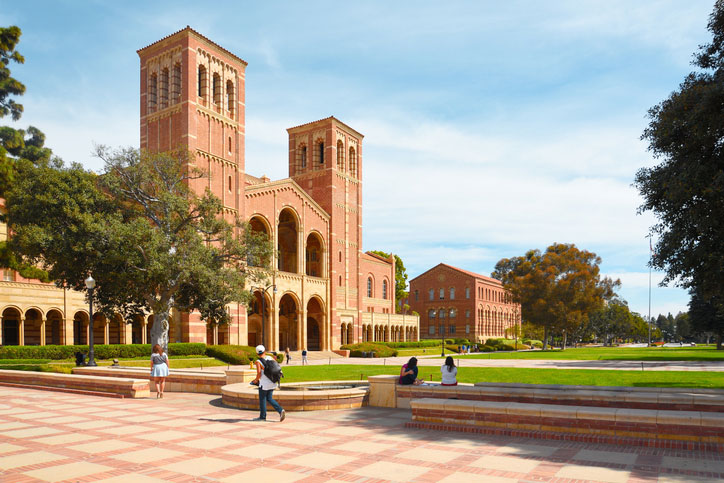Reviewed by Ashley (Brendle) Rey, MBA

The Master of Business Administration is still the most popular graduate degree in the United States. According to the National Center for Education Statistics, business degrees account for almost a quarter of all graduate degrees conferred in the country… and have for decades.
That many MBA students and grads out in the world make it a very competitive field. That’s as true on the front end with MBA admissions as it is out in the post-graduation jungle of the job market.
A reputable MBA from any of California’s highly respected business schools can certainly be the ticket to a successful career and the good life that comes with it. But even so, everyone knows that not all MBAs are created equal.
The top tier of California’s business schools stack the odds favorably for that kind of success. They are the ones with the most rigorous admissions policies, the most brilliant professors, the most well-connected alumni networks, the best reputations in the business world. They are the first stop for recruiters from Big Three consulting firms, the top choices for Silicon Valley AI startups, the places Hollywood comes looking for the next generation of studio execs.
The name of one of these business schools on your MBA diploma all but ensures your resume lands at the top of the stack in any hiring decision, anywhere. But you have to earn that MBA first, and the stone cold reality is that the odds are low of even getting into one of these schools.
Even if you’re not gunning for one of those programs necessarily, it’s a smart strategy to front-load on preparation as if you were. This guide will help up your chances of making the cut for any one of the MBA programs offered through California’s respected business schools, and will certainly give you a fighting chance at getting into the most competitive ones.
When Applying to California’s Most Competitive MBA Programs, You’ll Be Going Up Against the World
For every person that earns an MBA, there’s several more who don’t clear the hurdles for financing and admissions.
Everyone knows the short list of California business schools that offer the best prospects. And everyone knows it’s an intensive process to get admitted to any of them. You’re competing against the cream of the crop, not just of California, but of the world.
It is not uncommon for half of all admits to California MBA programs to be international students, and at some programs it’s even higher. Include admits from other parts of the country and you’ll find native born Californian’s make up a small portion of top tier MBA programs based here. And that’s among students who get in – you can imagine how many more are submitting applications.
And don’t imagine they haven’t heard what California has to offer. Weather, culture, capital… we’ve got it all here.
A lot of top MBA contenders would rather be a stone’s throw from Malibu Beach than shuffle through the snow in Schwartz Common.
Beach days and ski trips to Tahoe aside, attending a top business school in California means rubbing shoulders with professors, alumni, and students who are also on their way to the pinnacles of American business. The glow shines on everyone… coming out of one of these business schools means your odds of making the killer deal, landing the big client, or holding the reins of the next big unicorn go up exponentially.
How do you get your application to the top of the stack at the right school?
The Competitiveness of an MBA Program is Simply an Analog for Quality
It’s not that hard to identify the most competitive business schools. It’s practically a cottage industry; you already know the M7, the T10, T15, T25, maybe the T50, and you are exhausted by the debates over exactly where any given school fits in those Top rankings.
Everyone wants in because these programs are the best in the business. And they earned that distinction, in part, by maintaining strict standards for who gets in.
California is blessed with more than its fair share of elite business schools, including the perennial competitor for the top of the stack, Stanford’s Graduate School of Business. They aren’t shy about telling you just how slim your chances are:
Business School | Admit Rate (recently published data) |
Graduate School of Business – Stanford University | 5.81% |
Marshall School of Business – University of Southern California | 6.29% |
Rady School of Management – University of California – San Diego | 9.65% |
John E. Anderson School of Management – University of California – Los Angeles | 11.68% |
Haas School of Business – University of California – Berkeley | 20.9% |
Paul Merage School of Business – University of California – Irvine | 23.3% |
You need a high level of confidence and a lot of good reasons to imagine you’ll be in that top 10-20% who make the cut.
If you think you’re one of them, this is how you max out those odds.
With All MBA Applicants Presenting Similar Data, a Lot Comes Down to How You Tell Your Story and Tailor Your Application
If you’re serious about the MBA game, you’ve already mined the deep wells of the internet for the lore… you know that Stanford has the highest average GMAT scores but the smallest class sizes. You know Haas has a reputation for friendly interviews but a strong emphasis on cultural fit. And you are probably aware of the debate about how the rankings may neglect small schools with intimate programs like Cal Poly even though they enjoy sky-high reputation and unparalleled academic quality.
That speaks to a truth about getting into elite schools in California, which is that your applications can’t come out of a cookie cutter. Each of them has different processes and areas of emphasis. Your research and the way you tailor your application has to take that into account.
That said, there are a few areas of interest that every business school in the state is going to want to hear about. Your qualifications for each of them will have to hit some insanely high standards to make the grade.
Before you start obsessing over those details, though, you have to take a step back and acknowledge both the theater and the sincerity inherent in the MBA game.
All these schools have a strong reputation in both the California and the global business community.
Business school reputation is partly built on a success cycle—a strong reputation helps ensure graduates get the best jobs, which helps those universities stay in top rankings.
By and large, they take that responsibility seriously—they work hard to identify the secret sauce that makes their programs the best, and they look for candidates who both enhance that and benefit from it the most. Naturally, every school has their own take on what that is. Fortunately for you, they are happy to tell you all about it.
California’s most competitive business schools aren’t shy about putting current student profiles and motivations front and center on their websites. That’s information you can use to better understand exactly what makes the ideal candidate.
This is key because candidates for top b-school MBA slots often over-obsess about the importance of individual factors in isolation. But the truth is, it’s the totality of those factors that admissions committees are really looking at.
Quantitative analysis is the driving force in MBA studies. But the reality is, you can’t clear the bar for entry based on metrics alone. Getting into the most competitive California b-schools also involves a kind of performance. That’s to say, you need to weave together the data that tells your story in a way that lines up with what admissions committees are looking for.
You’re telling a story about yourself, your background, your personal motivations, and your professional ambitions. For these elite California MBA programs, it had better be a good one.
The Single Most Competitive MBA in California – Stanford Graduate School of Business
The most elite of the elites, Stanford Graduate School of Business, is crystal clear:
We look for students who will be engaged in our classrooms and create positive impacts on campus and beyond.
~ Stanford GSB MBA Admissions Criteria
Stanford University
Graduate School of Business
Stanford, CA
Website

MBA (on-campus)
Total Estimated Program Cost: $156,816
Also offers: PhD in (Accounting, Economic Analysis and Policy, Finance, Marketing, Operations Information and Technology, Organizational Behavior, Political Economics), MS in Management, Dual Degree MBA combined with (JD, MA in Education, MPP, MS in Computer Science, MS in Electrical Engineering, MS in Environment and Resources
- Accreditation: AACSB
- Ranked the top business graduate school of business in the nation by Bloomberg Businessweek
- Named the top full-time MBA program in the nation by U.S. News & World Report
- Global experience ensures a truly well-rounded exploration of business
The Stanford MBA, widely-known to be among the world’s finest, is where students gain global experience, plug into an international network of peers and alumni, and participate in an intensive exploration of how the world works, communicates, and lives. This two-year, on-campus program is designed to help students become better people and competent leaders. Offering the best faculty support from world-class researchers and business leaders and a collaborative learning environment in the heart of Silicon Valley, the Stanford MBA offers an exciting and transformative way to master the art and science of business. A global experience is the highlight of this program, allowing students to broaden their worldview and their horizons.
The school is also clear that they take a holistic view of your application:
- Background
- Experiences
- Perspectives
- Aspirations
- Values
- Accomplishments
It’s your job to use the application materials to tell a story of yourself that aligns with their criteria.
This is all in line with what Stanford’s program is really looking for, which is more about engaged, motivated, diverse, thoughtful candidates with demonstrated leadership skill and strong community values. You need to bring together the data—test scores, GPA, extracurricular activities, recommendations—in a way that shows that you are exactly the kind of candidate they are looking for.
Your application needs to convincingly say something about what you plan to accomplish in life and business, showing how GSB will help you develop the most important chapters of your story in the years to come.
Because all these data points are inevitably very similar to those that other applicants will be turning in, the real difference will be in how you portray them… your own personal presentation, with an audience of a few dozen adcom members.
What You Can and Can’t Control When Applying to a Competitive California B-School
 There is an entire category of attributes you have no control over that will factor into your admissions decision at elite business schools.
There is an entire category of attributes you have no control over that will factor into your admissions decision at elite business schools.
In climbing, there’s a word for these kinds of risks: objective dangers. Unlike subjective risks, which you can eliminate with planning and preparation, objective risks, like a rock falling on your head, simply exist no matter how prepared you are.
As you set out on your climb, then, you should understand the objective factors that adcoms will consider in making their final decision:
- Diversity Standards – Elite schools are where the research comes from showing disparities in accessibility to education. Most of them are committed to correcting those wrongs as well as exposing students to thoughts and concepts from other cultures.
- Popularity of the Program – The more people that apply, the more competition you’re up against. You can’t control how many other applications come in the door, but it’s worth thinking about the fact that adcoms do inevitably encounter many similar applicants.
- Your Own Personality – Business programs are as much a social exercise as they are a brass tacks education, so they put an emphasis on pulling together students who will gel with one another, meld into the broader school community, and function as a team.
While you can’t change these factors, you can attempt to mitigate them. If you feel you are too much in the usual mold of admits, climb outside your comfort zone with extracurriculars that at least expose you to more diverse worlds. Explore the reputation of the school to see if your personality is a good fit before you apply. Find some features of your experience that few other people can replicate.
Using Your Personal Experiences and MBA Admission Essays To Set the Stage

Your biggest opportunity to shape that story is through your own words.
The fact is, everyone with any serious shot at getting into these programs already has sky-high test scores, a strong undergraduate GPA, and impressive bachelor’s degrees under their belt.
Those are all just numbers, though. You could put them into a blender and come out with the ideal candidate score and just draw applications out of a hat as long as they met the mark.
That’s not what California’s most competitive MBA admissions teams do, though. They are looking for individuals who have a horizon that goes beyond the walls of school. You should have a big vision, big dreams, and be able to point out the evidence to them in your application.
The biggest opportunity to do so comes through the required admission essays that every one of these schools insists you submit.
Admissions essays are your best opportunity to write the story of your candidacy.
Your GPA and test score numbers are what they are; by the time you actually apply to a top California MBA program, that’s just what you have to work with. Chances are they are pretty similar to those of every other applicant.
Second Most Competitive MBA Program in California – University of Southern California’s Marshall School of Business
But essays are one of your true opportunities to express yourself and stand out from the pack. That’s a key piece of getting into the second-most competitive business school in California, the University of Southern California’s Marshall School of Business.
University of Southern California
Marshall School of Business
Los Angeles, CA
Website

Full-Time MBA (on-campus)
Part-Time MBA (on-campus, hybrid)
Executive MBA (hybrid)
One-Year MBA (on-campus)
Online MBA (online)
Total Estimated Program Cost: $152,523
Also offers: MS in Business Analytics, MS in Entrepreneurship Innovation, MS in Finance, MS in Global Supply Chain Management, MS in Marketing, MS in Social Entrepreneurship, Master of Business for Veterans, Master of Accounting, Master of Business Taxation, Master of Business Taxation for Working Professionals, Graduate Certificates in (Business Analytics, Financial Analysis and Valuation, Management Studies, Marketing, Optimization and Supply Chain Management, Strategy and Management Consulting, Sustainability Business, Technology Commercialization, Library and Information Management, PhD in Accounting, PhD in Operations and Data Science, PhD in Finance, PhD in Management and Organization, PhD in Marketing, BSBA, BSBA-Business emphasis, BS in Accounting, World Bachelor in Business, BS in the Business of Cinematic Arts, BS in AI for Business, BS in Real Estate Finance and Development, BS in Accounting and Finance, Minors in (Accounting, Business, Business Finance, Business Law, Consumer Behavior, Customer Analytics, Dynamics in Workplace Communication, Entrepreneurship, Management Consulting, Marketing, Operations and Supply Chain Management, Organizational Leadership and Management, Performance Science, Real Estate Finance, Risk Management, Social Entrepreneurship, Sports Business and Management, Technology Commercialization)
- Accreditation: AACSB
- Ranked among the top online and part-time MBA programs in the nation by U.S. News & World Report
- Expansive Marshall alumni network of 90,000+
- Marshall graduates are actively sought by the world’s leading companies like Amazon, Google, Salesforce, and Goldman Sachs
USC’s esteemed Marshall School of Business plays host to five, outstanding MBA programs designed for students at different career stages and with different scheduling needs. Led by a world-class faculty of researchers and practitioners, the programs here are dynamic and transformative. The Full-Time MBA, a two-year program for early career professionals, is designed to build on business fundamentals with an exploration of how to leverage technology for business and social impact. The Part-Time MBA is a 33-month program that’s ideally designed for working professionals looking to develop a more elevated understanding of business and leadership in a global environment. Students here study at the University Park campus, either on Tuesday and Thursday evenings or through a Saturday hybrid schedule. The Executive MBA is a part-time, two-year program for senior managers interested in exploring real-world issues and optimizing leadership skills and practices. Students here study in virtual classes and meet for on-campus study bi-monthly at the University Park campus. The One-Year MBA boasts an accelerated format and an internationally focused course of study for mid-career professionals. And the Online MBA, designed for fully employed professionals, allows students to elevate their professional competencies within a fully online format.
Marshall is typical of these elite programs in that they require two essay submissions addressing specific questions with your app, with an optional third essay that offers more free-form opportunity to impress the adcom with your drive and ability to communicate authentically.
These aren’t gotcha questions in any sense—Marshall, like most programs, wants to hear about:
- Your short and long-term career goals
- How you envision a Marshall MBA supporting those goals
- Examples of how you have successfully worked with a team toward a personal or professional goal
- Any additional information you’d like to present to support your application that didn’t make it into other essays or application data
There are tight word limits for the essays, usually in the 400-500 range. That means you need to be succinct as well as impressive. Your writing skills will come into focus as well as your actual answers. You’ll end up workshopping, refining, and revising your essays up into the moment you pop them into the app and hit send.
That third essay category is generally the one that helps ensure you don’t come across like someone who does nothing else but sit around hacking business cases all day.
You need something to talk about in your essays that goes beyond your stellar GMAT scores or even your amazing re-org effort at work that saved your company millions of dollars.
That’s where extracurriculars come in.
California Is the Place To Be To Build Extracurricular and Volunteer Experiences That Wow MBA Admissions Committees
Extracurriculars – ECs, or ECAs (activities) – are essentially everything you do outside of school that a business program might be interested in hearing about.
Fortunately, California is a great place for extracurriculars and volunteering. We’ve got amazing nonprofits, exciting activities, and a diverse population to engage with.
A good slate of ECAs is in the eye of the beholder. That really comes down to how well you tie them to your story. If you spend a lot of time glued to your Xbox controller in your spare time, that’s probably not a good extracurricular to mention… unless you are part of a Child’s Play initiative playing games with kids in hospitals to help take their minds off serious health problems and procedures.
Optimizing Your Undergraduate Experience to Support Your Story
 It’s probably clear by now that some of these decision factors are part of a zero-sum game. You can put your nose to the grindstone as an undergrad to get your GPA into the 3.8-4.0 range, or you can have a life outside school and bump your ECAs into the stratosphere. You may have some GMAT cramming to work in somehow, too, which is yet another tradeoff in one way or another.
It’s probably clear by now that some of these decision factors are part of a zero-sum game. You can put your nose to the grindstone as an undergrad to get your GPA into the 3.8-4.0 range, or you can have a life outside school and bump your ECAs into the stratosphere. You may have some GMAT cramming to work in somehow, too, which is yet another tradeoff in one way or another.
Once again, you have to think about how all these things factor in relation to one another and your central motivation and story. If you are already strong academically, in tough classes and with a decent GPA, but not particularly active outside of class, it may be worth letting some of the study sessions go so you can go out and do some volunteering or participate in other meaningful activities.
Your GPA may drop below 3.5, but it could be worth it if your ECAs end up painting a more well-rounded, well-supported picture of your experience and motivations.
These top schools aren’t going to be satisfied with a weekly shift dropping rolls on trays at the Skid Row Soup Kitchen. Your extracurriculars need to exemplify your character and goals in some way. They are often a path to showing leadership or planning skills that you may not have been able to surface in your job. Or they can reveal some quirk or aspect of diversity and team-play that demonstrates qualities that are in-line with the cultural fit that the school is looking for.
GRE and GMAT Exams Aren’t Always Required, but Always Important in Competitive Admissions

There’s been a sea change in the once all-important standardized business school admissions exam standing over the past few years.
First, the GMAT (Graduate Management Admission Test), sacrosanct for nearly 60 years as the One True Test Score to submit on a business school app was rudely shoved aside to share pedestal space with the humble GRE (Graduate Record Exam). With a perception of less quantitative rigor and a hint of less commitment to business versus other majors, the GRE got a lot of side-eye for a long time before it was genuinely accepted as an equal measure.
Some schools accept the GMAC Executive Assessment test, designed for older applicants who have been in the workforce for some time already.
Then many schools began to entertain waivers from students who felt their academic performance in quantitative coursework at the undergraduate level was more than sufficient to prove their capabilities. Others lifted the mandate for students on certain dual degree tracks in fields with heavy science requirements, like medicine.
Now, however, even some of these most competitive California business schools are making GMAT or GRE score submission entirely optional.
The Third Most Competitive MBA Program in California – UC San Diego’s Rady School of Management
That’s true at UC San Diego’s Rady School of Management.
University of California-San Diego
Rady School of Management
La Jolla, CA
Website

Full-Time MBA (on-campus)
FlexEvening MBA (on-campus)
Executive MBA (hybrid)
Total Estimated Program Cost: $94,464
Also offers: MS in Business Analytics, Master of Quantitative Finance, Master of Professional Accountancy, PhD in Business, Major in (Business Economics, International Studies-International Business, Business Psychology), Minors in (Business, Accounting, Entrepreneurship and Innovation, Technology Innovation and Supply Chain, Marketing, Finance)
- Accreditation: AACSB
- Options to add a Specialization Certificate to any of the MBAs: Specialization Design and Innovation, Finance, Marketing Management, Supply Excellence and Innovation
- Rady School of Management ranked second in the nation for Entrepreneurship by Bloomberg Businessweek
- Ranked among the nation’s top public universities by U.S. News & World Report
- Ranked among the best business schools in public universities by Bloomberg Businessweek
- STEM-designated MBA
UC San Diego is home to a collection of MBA programs delivered through the esteemed Rady School of Management, which has long been regarded for its focus on entrepreneurship. Students of Rady’s MBA programs are prepared to lead with confidence and develop the skills that today’s top businesses are looking for. Rady’s STEM-designation ensures that MBA grads here are equipped with outstanding, quantitative and analytical skills, while field placements with top San Diego-area companies kickstart the application of those skills through experiential learning. The Full-Time MBA is designed for students with three to five years of relevant work experience, expertly designed to begin building a business skills toolkit. The FlexEvening MBA, designed for students with between three and nine years of experience, is ideally designed to prepare you for the next phase of your career. Students meet two evenings weekly to complete the program in 24 to 30 months. The Executive MBA (formerly called the FlexWeekend MBA) is designed for rising leaders with at least 10 years of professional experience. It’s offered in a hybrid format that includes online study complemented by on-campus classes that meet on the Rady campus one weekend per month.
Rady’s full-time MBA is test optional. But that doesn’t mean you just send in your resume, GPA, essays, and recommendation letters, with the blind hope that the story it tells in totality will help you beat out the competition.
What Rady recommends is that you use the GMAT or GRE to compensate for other factors over which you may currently have less control:
- Not having a four-year undergrad degree from an accredited American university
- Having a cumulative GPA below 3.0
- Having less than three years of full-time work experience
- Are missing coursework in calc, stats, or other quantitative classes
And it tells you something that they still publish the average GMAT and GRE scores in their class profile: plenty of applicants are still taking those tests and submitting their scores, even though it’s “optional.”
Finding Reputable People To Put Their Recommendation in Writing for Your MBA Application

Getting into one of these elite b-schools is valuable in large part because they will shift the landscape of who you know in the California, national, and global business environments toward people who matter.
But even to get there, you’re going to want some influential friends behind you whose words carry some weight – you’re going to need some strong letters of recommendation to have any shot at getting accepted in the first place.
When we say “friends” we don’t mean actual friends, of course. The standard ask from adcoms is two recommendations, one or both of which should be from a direct supervisor or manager.
A recommendation from an alumnus of the business school to which you are applying would be pure gold, if you happen to have worked for one.
Competitive Business Schools Have Different Standards for Recommendation Letters
In some cases, good old-fashioned free-form letters are fine. They should speak to your qualities, the relationship you have with the recommender, and their own role and responsibilities.
But more often, recommenders are given some structured format to use that ensure they address the specific kinds of questions that adcoms want to see answered. Most schools, processing a high volume of applications put word limits on the letters, at the very least, to give you some basic parameters.
The Fourth Most Competitive MBA Program in California – UCLA Anderson School of Management
UCLA’s Anderson School of Management goes even further, providing a recommendation form to be filled out with:
- The recommender’s title and position, industry, and contact information
- Details geared to establish whether any conflicts of interest exist between the school, applicant, and recommender
- A specific set of competency ratings about the applicant in various personal and professional traits
- Specific questions about their relationship and interactions with the applicant, comparisons to other individuals filling similar roles in the organization, and an actual quantifiable level of recommendation they are willing to offer
University of California-Los Angeles
John E. Anderson School of Management
Los Angeles, CA
Website

Full-Time MBA (on-campus)
(Accounting, Brand Management, Corporate Finance, Easton Technology Leadership, Entertainment, Entrepreneurship, Global Management, Healthcare Management, Kayne Investment Management, Leaders in Sustainability, Marketing Analytics, Brand Management, Real Estate, Leadership Development, Social Impact, Consulting)
Fully Employed MBA (FEMBA) (hybrid)
Executive MBA (on-campus, hybrid)
Executive MBA+NUS (National University of Singapore)
Total Estimated Program Cost: $156,550
Also offers: Master of Financial Engineering, MS in Business Analytics, PhD in (Accounting, Behavioral Decision Making, Decisions Operations and Technology Management, Finance, Global Economics and Management, Management and Organizations, Marketing, Strategy), MBA+JD, MBA+MD, MBA + Master of Urban and Regional Planning, MBA+MPH, MBA + Master in Public Policy, MBA+MA in Latin American Studies, MBA+MS in Computer Science, MBA + Master in Library and Information Studies, Minor in Accounting, Minor in Entrepreneurship
- Accreditation: AACSB
- Expansive UCLA Anderson alumni network of 44,000+
- UCLA ranked the #1 public university in the nation for eight consecutive years by U.S. News & World Report
Each year, recruiters from top enterprises like Google and Goldman Sachs pursue Anderson School of Management MBA grads, and for good reason. UCLA Los Angeles plays host to four, outstanding MBA options, all expertly designed for students at different career stages and with different scheduling needs. The Anderson Full-Time MBA, which boasts an average salary bump of 85% among graduates, features a 22-month curriculum and no less than 15 options for specialization. Students of this program perform applied management research and enjoy the option of taking global immersion courses and completing international experiences. Some students may even launch a business during the program. The Fully Employed MBA (FEMBA) features a convenient, hybrid design and a personalized course of study, courtesy of a large number of elective options. The Executive MBA (EMBA) features a strong cohort of talented executives, two flexible format options, and a 22-month completion time. Students of the EMBA enjoy more than 20 international study options, more than 30 elective courses, one-on-one executive coaching, and a dynamic, leadership-focused curriculum. And the UCLA-NUS Executive MBA is a truly unique course of study that will expand your reach and understanding of global business with the support of two top schools. Students of this program study both domestically and internationally (four countries in just six months!) and earn two, world-class MBA degrees in just 15 months.
Of course, there is some space for the traditional free-form response that looks more like a traditional letter of recommendation. But you can see from the structure and aim of the questions what sort of qualities the admissions committee is looking for.
That means it’s on you to find recommenders who will have positive views of you in those respects.
But not just anyone with nice things to say about you will do. Since Anderson is very clear about wanting the opinion of your direct supervisor, or your most recent direct supervisor if you are currently out of the job market, not including them will require some substantive explanation.
With one slot filled by a past supervisor, you only have one other pick. The intent of recommendations is to get a view of your past professional performance and a view of your character from someone who has worked closely with you. Good bets can be:
- Higher executives in your organization who had a chance to get to know you and who you impressed on business projects
- Other professional colleagues of some stature and with a strong background themselves
- Clients you have worked closely with in a professional capacity
Using Volunteer Positions To Build Positive Buzz for Your Recommendations
This is also an area where you ECAs can come to the rescue. A glowing review from a non-profit director where you have been volunteering and making a difference can make a real impact on your application.
Other schools are less stringent about professional connections and stature, however. Stanford says instead they are unimpressed by the title or background of submitters, and instead ask that you choose recommenders who know you well through direct interactions within a three-year timeframe.
If you’re lucky enough to have a wealth of choices for recs and a school with lenient submissions rules, you’ll benefit from doing some pre-screening. You need recommenders who not only have a glowing opinion of your performance and the professional stature to engender trust in that opinion, but also those who have the skill to express it in writing.
In some ways, that can be a tougher lift than just finding someone with a great reputation and a high opinion of you. It can also be awkward asking for writing samples. If you can find other people for whom they have written recs, or other examples of their professional writing, it can save you both embarrassment and rejection.
Family members are explicitly disallowed, no matter how eloquent they are.
Acing the Interview Process is Key to Getting Into California’s Top Business Schools
Looking good on paper is one thing. Looking good in person is another. For California’s most competitive MBA programs, you’ll have to do both.
The in-person part comes through the admissions committee interview process.
The Fifth Most Competitive MBA Program in California – University of California Berkeley Haas School of Business
Actually, interviews are rarely conducted in-person anymore. California’s business schools are blessed with applicants from all over the world, and many use either current students or alumni to conduct their interviews, neither of which may be physically located near campus. So it is becoming common to offer an array of options for interviews. Haas at UC Berkeley, for instance, allows both live remote interviews and pre-recorded video interviews.
University of California-Berkeley
Haas School of Business
Berkeley, CA
Website

Full-Time MBA (on-campus)
MBA for Executives (on-campus)
Evening and Weekend MBA (on-campus, online)
Total Estimated Program Cost: $136,884
Also offers: Master of Financial Engineering, MBA + Master of Climate Solutions, MBA+MPH, MBA + Master of Engineering, MBA+JD, MA in Global Studies, BSBA with a concentration in Global Management, Major in Business, Dual Bachelor’s degree-Management Entrepreneurship and Technology
- Ranked among the top part-time MBA programs in the nation by U.S. News & World Report
- Ranked among the top public universities in the world by U.S. News & World Report
- Ranked among the top business schools in the nation based on ROI in salary
- Outstanding guidance and support – home to more than 40 career support professionals
UC Berkeley’s MBA options are born out of the esteemed Haas School of Business, which is largely regarded as one of the world’s most influential business schools. Offering three MBA models to align with different levels of experience, Haas continues to lead in the innovation and entrepreneurship education space. Choose the Full-Time MBA and you’ll dive deep into management fundamentals and leadership skills while becoming adept in the latest business methods. Choose the Evening & Weekend MBA, which is ideally tailored to busy, working professionals, and you’ll study after work hours and/or Saturdays. There’s also a new flex option that allows students to complete this program in an online format. Or choose the MBA for Executives and you’ll join a cohort of like-minded working executives who meet on-campus every three weeks, Thursday through Saturday.
Haas has a reputation for friendly, almost conversational interviews that focus on cultural fit, but each program is different. Stanford focuses on behavioral questions, while some say Anderson’s interviews are more professional than warm, and more closely model the kind of interview you’d expect for a corporate management position.
The nature of person-to-person interviews will mean that no two experiences will be exactly the same, even at the same school.
As with most elite b-schools, you will have no trouble finding lists online from recent applicants detailing the questions they were asked during their Haas interview. You should drill those questions so you don’t end up facing anything unexpected and risk drawing a complete blank during your interview.
Remote Live or Pre-recorded Interview – Consider the Pros and Cons of Each
 The fact that most interviews are now conducted remotely has made them easier to schedule, but it’s also introduced a new concern: technical glitches.
The fact that most interviews are now conducted remotely has made them easier to schedule, but it’s also introduced a new concern: technical glitches.
Repeated problems with an online interview can both create an inadvertently negative impression and throw you off your game. In other cases, interviewees report that the format makes it hard to bond with the interviewer.
Pre-recorded videos take some of the challenges off the table but introduce others: the online recording system allows you time and feedback in debugging your connection and computer so you can get the ideal picture. On the other hand, you are simply given pre-recorded questions on screen from an adcom member and given a time limit in which to reply. You have no opportunity to ask for clarifications.
One method or the other may make more sense for your personality and preferences. However, not all candidates get a choice — if in-person interview slots fill up, you may get the prerecorded option no matter what your preference.
The Right Business Background Makes You a Much Stronger MBA Candidate

An MBA isn’t something most people jump into directly after earning their undergraduate degree, particularly not at top schools. Most of these programs recommend you have between two and eight years of actual working experience before you even think about applying. For accelerated or executive programs, that can push up to a decade or more.
The consensus is that without practical business experience behind you, you are unlikely to get the most out of your studies. You need real-world scenarios and situations fresh in your mind to really connect with what your professors are teaching.
Building your work experience can also begin as early as your undergraduate studies, where internship placements associated with your bachelor’s degree can provide great talking points and knowledge that MBA adcoms value.
Career progression is a key thing that adcoms are looking for. In effect, they’re outsourcing some of the judgement of your ability and potential to your current employers. If your managers and supervisors have seen something positive in your work performance, that’s a good indicator you’ll make a solid MBA candidate.
Patience can be a virtue in honing work experience for the most competitive California business schools. This is part of why it’s important to apply to top schools only after you’ve had enough years on the job to demonstrate that you are going places.
Where you work may also factor into admission decisions. While these top California programs are elite enough to draw in applicants from all over the world and every kind of industry, you will notice that some of them have a distinct lean toward applicants from particular backgrounds.
The Sixth Most Competitive MBA Program in California – University of California Irvine Paul Merage School of Business
That’s the case at Irvine’s Paul Merage School of Business. Over 20 percent of the 2024 class is draw from the pharmaceutical, biotech, or healthcare industries. Another 18 percent each come from technology (not unusual for any MBA program) or government/military backgrounds (not so common).
Two things are going on there, both important to consider when you are thinking about applying: you may be shaving a tiny sliver off the odds against you if you aim for a school with a track record of recruiting from your current industry. And you are more likely to be making solid professional contacts and mind melding with students who can boost your career the most after graduation if you plan to stay in that industry.
A word of warning, though: diversity continues to be a goal for every one of these highly selective business schools. If they start getting too top-heavy in any particular field, you might find they react by actively looking for candidates outside of the areas for which they are known.
University of California-Irvine
Paul Merage School of Business
Irvine, CA
Website

Full-Time MBA (on-campus)
Flex MBA (on-campus, online, hybrid)
Executive MBA (hybrid)
Total Estimated Program Cost: $89,375
Also offers: PhD in Management, Master of Finance, Master of Innovation and Entrepreneurship, Master of Professional Accountancy, MS in Business Analytics, MS in Biotech Management, Minor in Business, BS in Business Information Management, BA in Business Administration
- Accreditation: AACSB
- Options to add a Certificate in Entrepreneurship, Digital Transformation, Healthcare, or Real Estate to your MBA
- Consistently ranked among the top 5% of business schools worldwide
- Ranked among the top full-time MBAs among public institutions by the Financial Times
- Named the top Executive MBA program in Southern California by The Economist
- Ranked among the top full-time MBAs in the U.S. by the Financial Times
- STEM-designated MBA
- Home to outstanding, faculty-led research centers
Designed to produce leaders for a digitally driven world, UC Irvine’s MBAs are part of the esteemed Merage School, consistently ranked among the top 5% of business schools in the world). The programs are led by faculty members rich in business experience, and offer a collaborative culture of learning, a powerful network of learners, and a business community and alumni network that values innovation. The Full-Time MBA, designed to prepare leaders who understand how to align business strategies with the demands of an increasingly technology-driven world, is now fully STEM-designated, thereby ensuring that students have the skills and knowledge of management science and quantitative methods. The Flex MBA is a part-time program that’s ideally designed for busy, working professionals. Offering the same, world-class education as the Full-Time MBA, this program allows students to take classes on campus, online, or a combination of the two. And the Executive MBA is a 21-month program that’s expertly designed to produce tomorrow’s C-suite leaders. Students of this program meet every third weekend of the month.
Making Your Undergraduate Degree Part of Your Application Story

Just like future employers are going to look at your MBA immediately to see where you earned it, b-school admissions committees are going to pick up your undergrad transcript and look right away to see what college you got it from.
A look at LinkedIn or alumni resumes tells the story: many of the same top California business schools that deliver elite MBA degrees are also where those folks earned their undergrad degrees.
It’s not as simple as picking out, say, Berkeley as your undergraduate school if you plan to apply to Haas for your MBA, though. Cross-pollination is a real consideration for admissions committees—no elite MBA program wants to look too insular. So a quality bachelor’s from a different California college, or even an out-of-state school, may actually benefit you more.
Your undergraduate GPA matters considerably, too, but not always in the way you might think. Once again, it’s about supporting the story of your motivations and goals. If you came out of a mid-tier school because that’s what your parents could afford and you only pulled a 3.3 because you were working part-time while you were studying, that may play right into a personal narrative about overcoming long odds to get where you are and your drive to achieve even more.
Maybe more important to these highly competitive programs is what exactly you studied. Stanford, for instance, prefers candidates who have demonstrated strong quantitative proficiency with coursework in areas like:
- Calculus
- Statistics
- Microeconomics
They’re also going to be extremely interested in what that major was. Don’t make the mistake of thinking that a business degree is a must-have to be competitive in MBA admissions.
University of California Davis Graduate School of Management
At the UC Davis’ Graduate School of Management, for example, the largest percentage of admits in 2024 had undergraduate degrees in engineering. Business was indeed number two, but degrees in the social and behavioral sciences was third, followed by physical and earth sciences. Even biological and agricultural sciences came up at seven percent.
That’s not surprising if you know about the Davis GSM program. Davis is nationally ranked, but it’s best known in California. That’s because it doesn’t focus on the flash and glamour of consulting, finance, or trendy topics like AI. Instead, with pioneering research partnerships in fields like sustainable energy, food and agriculture, and biotech, it turns out executive-quality graduates who go on to helm the kind of California industries that endure. It follows that applicants there should have degrees that offer foundational knowledge in those fields
University of California-Davis
Graduate School of Management
Davis, CA
Website

MBA (on-campus, online, hybrid)
Full-time MBA (on-campus)
Part-Time MBA (Bay Area or Sacramento) (hybrid)
Online MBA (online)
Total Estimated Program Cost: $99,024
Also offers: Master of Management, MS in Business Analytics, Master of Professional Accounting, Minors in (Accounting, Technology Management), Major in Business
- Accreditation: AACSB
- Ranked among the nation’s top 20 full-time MBAs by Bloomberg Businessweek
- Ranked among the nation’s top 20 public part-time MBAs by U.S. News & World Report
- STEM-designated UC MBA emphasizes quantitative analysis and data-driven decision making
- Home to the Collaborative Leadership Program - a year-long, two-part elective course sequence plus a community service experience
Teaching excellence, pioneering research, and an internationally recognized faculty come together at UC Davis to offer emerging and practicing business leaders outstanding MBA opportunities. Boasting a STEM-designated curriculum that’s anchored by IMPACT (Integrated Management Project and Articulation and Critical Thinking), these programs allow students to learn how to develop strategic solutions for companies ranging from small startups to major corporate enterprises. Choose the Full-Time MBA and you’ll study on campus, learning from the best and connecting with the region’s thriving business regions and research communities. Choose the Part-Time MBA and take either the fast-track option or the standard-track option, completing your degree in either 24 or 36 months. Students here attend virtual evening classes twice a week and then head to the UC Davis Sacramento Health campus or the Bishop Ranch campus to participate in intensive experiences every other Saturday. Or choose the Online MBA and you’ll enjoy the flexibility of earning a UC Davis MBA from anywhere in the world.
Getting Into One of These MBA Programs is One Thing… Covering the Cost is Another

Any business major worth their salt can tell you that the price of a good or service in demand will rise until there is an equilibrium of customers willing to pay it with the amount available.
There’s an awful lot of demand in the elite California MBA market and not a lot of supply. Which means the cost of tuition in top programs is sky-high.
There are plenty of justifications for that pricing in the top salary rates that graduates from these programs pull down out in the job market. But before you get out into the market, you still need to make sure you can pay you tuition bills to stay in the program.
So you will also need to start planning well ahead of time for how exactly you will pay your tuition if you do actually manage to clear the bar for being admitted to one of these schools.
California State University San Marcos College of Business Administration
On the other hand, you shouldn’t overlook highly competitive public university MBA degrees that are also highly affordable, such as CSU San Marcos’ College of Business Administration.
California State University San Marcos
College of Business Administration
San Marcos, CA
Website

Fully-Employed MBA Program (hybrid)
Specialized MBA Program (on-campus)
(Supply Chain Management, International Business, Business Analytics)
Total Estimated Program Cost: $22,948
Total tuition comes in at $19,658 below the state average for similar programs.
Also offers: Business Foundation Certificate of Advanced Study (Graduate), Business Intelligence Certificate of Advanced Study (Graduate), Core Business Knowledge Certificate of Advanced Study (Graduate), Health Information Technology Certificate (Graduate), Hospitality and Tourism Management Certificate of Advanced Study (Graduate), International Business Certificate of Advanced Study (Graduate), Professional Accounting Certificate of Advanced Study (Graduate), Certificate of Specialized Study in Water Management & Leadership-Intermediate Level, Military Science Certificate of Specialized Study, BSBA with concentrations in (Accounting, General, Professional, Finance, Global Business, Entrepreneurship, Management, Management Information Systems, Marketing, Business Analytics, Global Supply Chain Management), Minors in (Business Administration, Global Business Management, Management, Management Information Systems, Marketing, Supply Chain Management)
- Accreditation: AACSB
- Specialized MBA features your choice of three specializations for a personalized course of study
- Fully Employed MBS boasts features a dynamic cohort model and a blend of online and in-person learning
California State University San Marcos’ MBA programs are priced nearly $20,000 below the state average among similar programs, making them a clear standout for value in California. The Fully Employed MBA features a cohort model, an 18-month design, five-week classes, and a hybrid format that includes a blend of on-campus and online learning. The Specialized MBA, expertly designed to accommodate the learning needs of recent graduates (business and non-business majors alike), features three specialization options that deliver a truly personalized learning experience. This accelerated program includes evening courses, a cohort-based learning model, and the convenience of a 12-month design.
Believe it or not, this small program, built for intimacy with only around 20 students per cohort, is highly selective, admitting less than half of applicants. The small class sizes assure a lot of face time with experienced professors and a more tailored curriculum plan. You won’t have the vast legions of alumni to tap into out in the workforce, but you will have much stronger connections with those you encounter during and after the program.
In the Competitive MBA Game, It’s Wise to Increase Your Odds Through Diversification

When aiming for highly selective California MBA programs, you’re going to experience rejection. After all, that’s the defining nature of competition: not everyone is a winner.
But the nature of business isn’t to accept that as an answer. Your course of study for an elite MBA is going to be all about how to stack the deck in your favor in a competitive market. And to learn to turn rejection into success.
One path to that in the MBA application process is to cover your bases with multiple applications.
This is a sort of hedge against the many things that can lead to a rejection:
- A blown interview
- Being out-competed in the academic standards department by other students
- Flubbing an essay question
- Not having the right kind of ECAs your top choice is looking for this year
It’s also a kind of practice—when you go through the process more than once, you get better at it. Your essay writing will improve, you’ll be more comfortable in the interview, you won’t find it as intimidating to ask for recommendations.
California State University Fresno Craig School of Business
It can be particularly important if you are aiming at a school like the Craig School of Business at CSU Fresno, which has acceptance rates that bounce around between thirty and sixty percent. With such a wide band of possibilities from year to year, you will want to give yourself a cushion in case it’s a particularly tough year to get in.
California State University, Fresno
Craig School of Business
Fresno, CA
Website

MBA (hybrid)
MBA for Executives - EMBA (on-campus)
Total Estimated Program Cost: $25,488
Total tuition comes in at $19,118 below the state average for similar programs.
Also offers: BSBA, BA in Economics, BA in Fashion Merchandising, BS in Accountancy, BS in Finance, Minor in Economics
- Accreditation: AACSB
- EMBA designed for business professionals with at least 10 years of professional experience and at least three years of managerial experience
- MBA features a blend of online and on-campus courses
- Outstanding alumni network of 300,000+
- Ranked among the top universities in the nation for social mobility by the Wall Street Journal
The California State Fresno MBA is priced with affordability in mind and designed in two formats to meet you where you’re at in your career. Their traditional MBA, which is designed for students with limited professional experience, is delivered in a blended format that allows students to take both on-campus and online courses. The curriculum of this program emphasizes applied learning and is ideally structured to suit students who are looking to make the transition from college learning to a career in business. It also comes complete with the option to study internationally through their Summer Study Abroad program. The MBA for Executives program, which is designed to suit students with at least 10 years of professional experience and at least three years of managerial experience, begins with a boot camp of prerequisite courses and then progresses with Saturday courses for a quick, 17-month completion.
San Diego State University Fowler College of Business
Other highly-ranked programs, like San Diego State’s Fowler College of Business MBA should also end up on your list of applications.
San Diego State University
Fowler College of Business
San Diego, CA
Website

MBA (on-campus, online)
(Finance, Health Services Administration, Information Systems)
Total Estimated Program Cost: $30,780
Total tuition comes in at $13,826 below the state average for similar programs.
Also offers: MS in Global Business Development, MS in Accountancy, MS in Global Business Development, MS in Information Systems, MS in Finance, MBA+MA in Latin American Studies, MSBA in Financial and Tax Planning, MS in Supply Chain Innovation, BSBA with focuses in (Accounting, Finance, Financial Services, General Business, Information Systems, Management, Marketing, Real Estate, Accountancy), BA in International Business, Minors in (Accounting, Business Administration, Entrepreneurship, Finance, Information Systems, Management, Marketing, Real Estate)
- Accreditation: AACSB
- Outstanding range of specializations for a personalized learning experience that aligns with your professional goals
- Superb record of graduate success – 92 percent of all grads are employed within six months of graduation
- Ranked among the Best On-Campus MBA Programs by the Princeton Review
- Ranked among the top Part-Time MBA programs in the nation by U.S. News & World Report
- Fowler named among the Top 50 Best Public Business Schools by U.S. News & World Report
San Diego State University’s MBA is dynamic, affordable, and flexible, offering students an outstanding tuition and a flexible format that includes your choice of on-campus and online study. Offered with your choice of three specializations, students of San Diego State’s MBA enjoy a personalized learning experience and plenty of real-world experiences. Choose electives to design a program that best aligns with your career goals or choose them according to your specific career focus – project management, supply chain management, accounting, marketing, international business, and more!
Not only does applying to more than one of California’s top programs up your odds of getting in, but it may give you more choices if you are accepted to several of them.
Considering California MBAs That You Can Actually Expect to Get Into
 MBA programs and top MBA applicants are sometimes too much in thrall to the magic of quantitative analysis. If the word obsessive doesn’t mean anything to you, try taking a look in the mirror… you just crunched through almost 5,000 words to hone your edge ever so slightly in the MBA application process.
MBA programs and top MBA applicants are sometimes too much in thrall to the magic of quantitative analysis. If the word obsessive doesn’t mean anything to you, try taking a look in the mirror… you just crunched through almost 5,000 words to hone your edge ever so slightly in the MBA application process.
The crowds sometimes sleep on California colleges that have highly respected, strongly led, well-resourced MBA programs that don’t land on the top half of a list like this.
It’s a big state, though, and it’s not that hard to identify schools that really should get a second look even if they don’t spend a lot of time bragging about how tough they are to get into.
Redefining California Competitive To Meet Your Personal Goals
This is particularly true when you take a minute to step back and think about your goals.
Every top b-school in the state wants to hear about your goals and how their program will enable you to reach them. But don’t get caught up in massaging them so much that you forget where your real interests lie. You might find that it’s more the scope of your goals and less the ranking of the school that matters.
That’s particularly true out here on the West Coast. You don’t have to get on the hype train to VC pitches on AI innovation to earn respect in the business world here. Marching to the beat of your own drummer is a time-honored tradition.
So there are some California schools that are competitive not so much when they are thrown into the mix with other heavyweight business schools, but instead when you consider them in light of the highly specialized niches where their expertise is solid gold.
University Argyros College of Business and Economics
Chapman University falls into that category, with a unique MBA specialization in Entertainment and Media Management offered by the Argyros College of Business and Economics that has few head-to-head alternatives in the LA area, or even globally.
Chapman University
Argyros College of Business and Economics
Orange, CA
Website

Full-Time MBA (on-campus)
(Accounting, Business Analytics, Entertainment and Media Management, Entrepreneurship, Finance, Global Business, Marketing, Strategic Management)
Flexible MBA (on-campus)
(Accounting, Business Analytics, Entertainment and Media Management, Entrepreneurship, Finance, Global Business, Marketing, Strategic Management)
Executive MBA (on-campus)
Total Estimated Program Cost: $100,750
Also offers: MS in Accounting, MS in Behavioral and Computational Economics, MS in Real Estate, JD-MBA, MBA-MFA in Film and TV Producing, MBA-MS in Food Science, BS in Accounting, BSBA, BA in Economics
- Accreditation: AACSB
- Expansive worldwide alumni network of 50,000+
- Ranked among America’s top 15% colleges and universities by the Princeton Review
- Ranked among the top full-time MBA programs in the nation by U.S. News & World Report
- STEM-designated MBA
Chapman University’s MBA programs prepare career-minded students to become successful leaders, executives, and entrepreneurs. Offering no less than three MBA formats to meet you where you’re at in your career, Chapman is where you’ll find an outstanding, global alumni network, a renowned faculty of researchers and industry experts, and formats that align with your busy, professional life. The Full-Time MBA is designed as an intimate cohort and is personalized with your choice of eight specializations. The Flexible MBA is just that – a flexible program that features self-paced courses that are offered either during the day or in the evening. Choose from eight specializations, complete it in a part- or full-time format, and take global travel courses, if desired. The Executive MBA, which is expertly designed for ambitious, mid-career managers and executives, comes complete with international experiences, opportunities to network with top executives, and outstanding executive coaching and professional development services.
Chapman’s overall acceptance rate is around 75 percent, but when it’s your only real option in the field, you’ll find yourself sweating bullets like you were waiting on a call from Stanford.
Then there are other ways in which your constellation of top schools can be limited by personal preference. For example, if earning an MBA from a college with a Christian worldview is important to you, all those top public schools and many of the private universities are suddenly off the board.
Pepperdine University Graziado Business School
Instead, you’ll be looking to a program like Pepperdine University’s Graziadio Business School.
As a Christian university, you’ll find the MBA options there infused with values and virtues that are increasingly uncommon at other schools. With an admission rate only around 60 percent, it’s far from a sure thing. But it may be one of your top picks if both critical business skills and a strong ethical and values-based business education are important.
Pepperdine University
Graziadio Business School
Malibu, CA
Website

Full-Time MBA (on-campus)
(Business Analytics, Digital Innovation and Information Systems, Entrepreneurship, Finance, Leadership and Managing Organizational Change, Marketing)
Full-Time (12 Month) MBA (on-campus)
(Finance, Marketing, SEER Certificate)
Part-Time MBA (online, hybrid)
Presidents and Key Executives MBA (on-campus)
Executive MBA (on-campus)
Total Estimated Program Cost: $109,620
Also offers: Executive DBA, MS in Organization Development, MS in Business, MS in Applied Finance, MS in Global Business, MS in Real Estate, MS in Business Analytics, MS in HR, MS in Management and Leadership, BS in Management degree completion, BSM to MBA
- Accreditation: AACSB
- Ranked among the top business schools and the best full-time, part-time, and online MBAs in the nation by U.S. News & World Report
- Ranked among the best business schools in the nation by the Princeton Review
- Presidents and Key Executives (PKE) MBA is the world’s premier program tailored exclusively for top-level executives and C-suite leaders
Building on its reputation as one of the top business schools in the nation, Pepperdine University’s Graziadio Business School offers an MBA program that’s designed to develop aspiring leaders, change agents, and entrepreneurs. This exciting course of study, focused on a values-based curriculum and outstanding, experiential learning opportunities, will provide you with the skills and knowledge needed to launch your business career and become a competent, strategic leader. The Full-Time MBA comes complete with a customizable curriculum with your choice of six concentrations, an expert faculty of successful professionals, real-world learning through client-based projects, outstanding mentorship opportunities, and the option of an accelerated design that can be completed in just 12 months. The Part-Time MBA, ideally designed for working professionals, can be completed online, in a hybrid format, or as a Fast-Track program that takes just 20 months to complete. The Graziadio Business Schools also offers two Executive MBA programs for mid- to senior-level professionals. The Presidents and Key Executives (PKE) MBA and the Executive MBA (EMBA) meet at multiple campus locations to accommodate the busy schedules of working executives.
Competition is the lifeblood of business. So the last thing you should do is shrink from it, no matter what your ultimate goal is in attending business school. Putting it all on the line when the odds are long may not come with any assurances, but it’s the play that comes with the biggest possible rewards.
